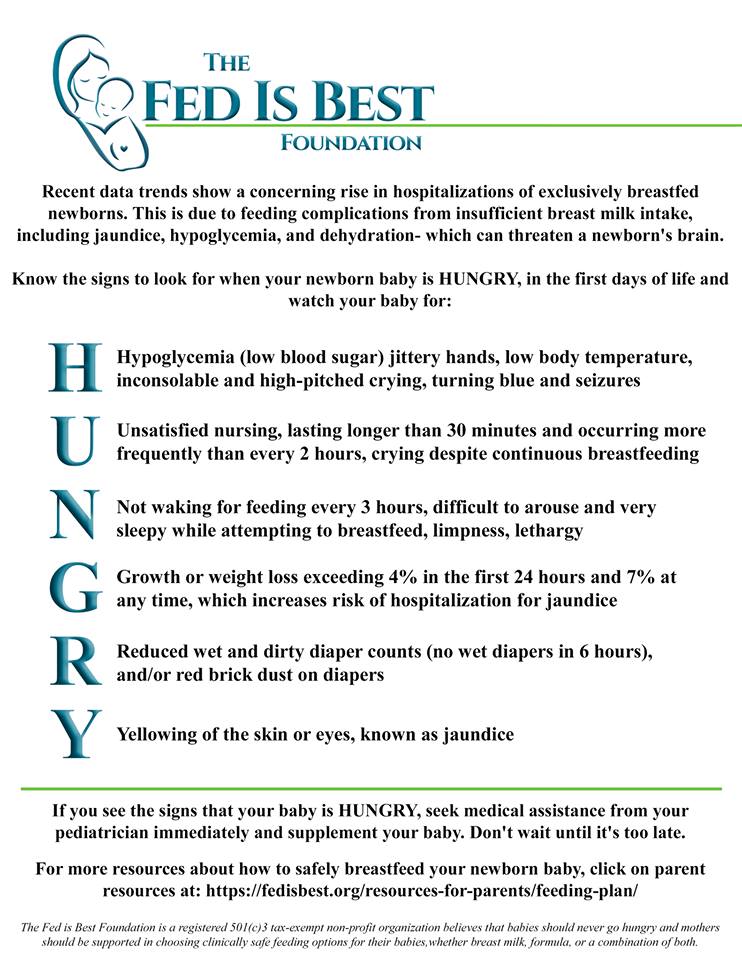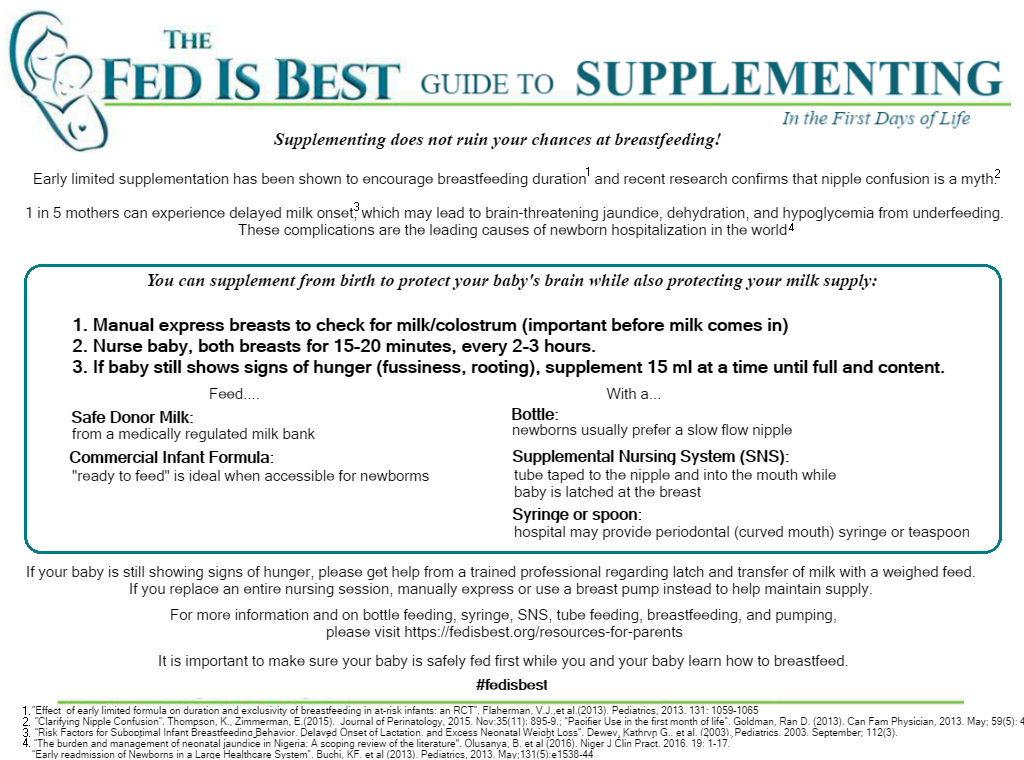By Jamie Nguyen
As new parents, my husband and I relied on professionals: doctors, nurses, lactation consultants to guide us in providing the best care for our newborn. But what happens if most of these professional have bought into a dangerous lie? The lie that all moms, except in very rare cases, are able to produce enough milk for a newborn baby.
After a long unmedicated labor that lasted over 36 hours, my daughter Noemie was born on November 2nd 2016. She was perfectly healthy and weighed 7 lbs 3.5 ozs. My goal was to exclusively breastfeed and the staff at the Baby-Friendly hospital were very supportive. Noemie lost 4% of her weight in the first 24 hours and we were told that it wouldn’t be anything to worry about until it got to more than 7%. However, she had become very fussy and inconsolable, but as we were new parents we just assumed that this was normal baby behavior. Having taken a breastfeeding class, I simply trusted that my body would make enough milk for her. I had been told that not being able to make enough milk was very rare. I asked to see a lactation consultant as I had previously had breast surgery to remove a benign lump from my right breast. The lactation consultant told me that I should have no problem breastfeeding from just my left side. She reassured me that my milk would “come in” sometime over the weekend at day 4 – 5. We were told to get a weight check at the pediatrician’s office on day 4.
On day 4, Noemie was down 11% of her weight. The physician’s assistant we saw said that this would be the time to think about supplementing but that it would be fine to wait a little longer. Since we were determined to breastfeed and believed that my milk would come in by at least day 5, we decided to wait. That night, my mom came over to help care for Noemie so that my husband and I could get some rest. Noemie was fussy and inconsolable throughout the night. Finally, in the middle of the night and after lots of fussing, my mom asked me if I had milk. I told her that I thought I did, but she informed me that a baby that is well fed is calm and that my baby was hungry. My mom has raised seven children and successfully exclusively breastfed the first three so I knew that my mom knew what she was talking about. I told her that I thought it was just that Noemie needed to burp, had gas, or colic but that we had an appointment with the pediatrician in a couple days and I would ask about it. My mom was very concerned and continued to try to convince me to supplement. I wasn’t even sure how to supplement and felt that I needed a doctor or a professional to tell me it was necessary and show me what to do.
The next day, my milk appeared to come in. I felt engorged and milk started to leak from my nipples. I was ecstatic and decided to feed Noemie as much as she wanted. Noemie began to take long naps after feeding, sometimes up to 4 – 5 hours. I thought she was sleeping well because she was feeding well. Little did I know that she was sleepy because she was not getting enough and was trying to conserve her energy. When we went to the pediatrician’s office the next day I was devastated to learn that Noemie was down 16% of her birth weight and weighed only 5 lbs 15.5 ozs. By this time Noemie had brick dust in her diapers and her lips were chapped. We took a diaper in to show the pediatrician. He did not seem worried at all. I told him I was confused because it seemed like my milk had come in. He advised me to continue breastfeeding and to pump after each feed and give anything that I pumped to Noemie.
When we came home and I started pumping after each feed, I was alarmed that I could only pump 2 – 3 mls from each breast. At this point, I started to panic but still did not know what to do. Luckily, a lactation consultant called me to check in on how things were going. I told her about everything that had happened and that I was worried that Noemie was starving. She wanted to see me right away but I was unable to make it to see her that day as my husband had another obligation. Also, I did not fully understand the urgency and did not know that there were serious risks that come with starvation. Although I was in distress, I reminded myself that in our breastfeeding class we learned that a baby has enough fat on their body to sustain them through the first few days until mom’s milk came in. It was only months later that I learned from the Fed is Best website the serious risks of starvation such as brain damage and death. I made an appointment to see the lactation consultant first thing in the morning the next day. That night was one of the worst as Noemie fussed all night and I was now aware that she was hungry but didn’t know what to do. I voiced my worries to my husband and he told me that if I was so worried then we should go out and buy some formula right away and feed it to her. But I was at a loss since formula was supposedly a last resort and the most undesirable way of feeding my baby and again I felt that I needed a professional to tell me that it was okay.
The next day, on day 6, we went in to see the lactation consultant. By this point, Noemie was down 18% of her birth weight and I was only able to transfer a couple milliliters of breastmilk to her in a ten minute feed. The lactation consultant said that Noemie needed to be supplemented immediately. She pulled out a bottle and instructed my husband on how to feed Noemie. As my husband began feeding her, tears started falling from my eyes. I was so incredibly relieved that Noemie was finally getting the nourishment she needed. I also felt bad that I was so clueless on how to feed her and that she had suffered for a whole week as a result. Lastly, I felt sad that my body had failed her and that it wasn’t able to provide for her like a normal mom would.
It is only now, six months later and after some research as well as seeing other new moms and babies suffer through a situation similar to ours that I’ve come to realize that it is not uncommon for moms to not be able to produce enough milk for her baby in the first few days and weeks of a baby’s life. There are so many reasons for delayed milk and low milk supply such as having a long labor, PCOS, latch issues, surgery, IGT, etc.. It is a lie that every mom can make enough milk for her baby and that all it takes is hard work and commitment. Moms who are not able to make enough milk are left feeling as though something is seriously wrong with their body or that they did something wrong in their attempts to breastfeed when it is not unusual at all. It breaks my heart to hear that so many new moms are learning the hard way that breast is not always best.
I wish I had known not only the signs of hunger but also how to supplement. I am surprised that no one from the staff at the hospital nor the pediatrician’s office informed me on what to look for and how to supplement. In fact, the physician’s assistant in our pediatrician’s office scolded us for not supplementing Noemie sooner after the lactation consultant sent notification that our baby was being supplemented. The physician’s assistant told us that if we had not supplemented our baby would’ve had to go to the hospital. I could only stare at her in disbelief but I was thinking “Hello, why didn’t you tell me this before? No one told us anything about the risks. I didn’t know what to do and was relying on you and your team for guidance”.
My husband and I both realized that breastfeeding was our goal, not Noemie’s. I continued to work on breastfeeding but always made sure that Noemie had enough to eat via formula. I noticed immediately how calm and alert Noemie was the day after we started supplementing her to her satisfaction. Today, Noemie is happy, healthy, and thriving. I know that I am lucky that things didn’t turn out worse for her. When I think back to those first few days I still tense up at how dangerous the situation was. I am grateful that my mom was there to tell me that my baby was hungry. I’m grateful for the lactation consultant that followed up with me and helped me to supplement. And as much as I love breastfeeding, I’m extremely grateful for formula. There is absolutely no reason for a baby to starve and risk dehydration, brain damage, or death because of the determination to breastfeed. I hope that all new parents are informed about these risks, what signs to look for, and how to supplement.
The Fed is Best Foundation is dedicated to the prevention of newborn and infant starvation from insufficient exclusive breastfeeding. We do so by studying breastfeeding stories sent by mothers and the scientific literature on breastfeeding complications that lead to infant brain injury and death. Since the beginning of our campaign almost two years ago, we have received tens of thousands of newborn and infant starvation stories leading to the complications of hyperbilirubinemia, dehydration, hypernatremia, hypoglycemia and failure to thrive. These complications occur because the current breastfeeding guidelines have not been studied for safety, operates with little awareness of the caloric and fluid requirements of newborns nor the amount transferred to babies until complications have already occurred. “Just one bottle” can save a child from these tragedies as it is often a mother’s first clue that a child is in fact starving from exclusive breastfeeding.
If your baby is experiencing distress and signs and symptoms of starvation, we encourage you to advocate for your child. You have the right to feed your child and your child has the right to be fed. No one but your baby knows how close they are to empty. The only way they can communicate distress is by crying. Listen to your baby and listen to your instincts.
Our message is simple. Feed your baby. Feed them as much as they need to stay safe and satisfied. Only they know what they need.
For more information on how to protect your baby from feeding complications due to early exclusive breastfeeding, please read and download the Fed is Best Feeding Plan, a way to communicate your feeding choices to your health care providers.
In addition, please read and download the Fed is Best Weighing Protocol to prevent newborn dehydration and failure to thrive.
Our full list of parent resources can be found on our Resource Page.
If you wish to help parents learn how to protect their newborns from accidental starvation, please share this story and sign our petition to demand that the CDC, the AAP, the U.S. Surgeon General and the WHO/UNICEF Baby-Friendly Hospital Initiative warn parents about the dangers of newborn and infant starvation from insufficient exclusive breastfeeding. Go to http://fedisbest.org/sign-our-petition/.
If you would like to donate to the educational outreach efforts of the Fed is Best Foundation, please go to our Donation Page and receive a free Fed is Best charm or button.








Wow. Such a miracle that she survived all that without any permanent damage. I didn’t have milk for any reason. Just never got it. On day 4, I couldn’t wake my daughter up. She had lost 11% of her body weight. We rushed to the hospital, they gave her a bottle. Her blood sugar was 51. They say below 50 can be brain damage. We are both very very lucky. My daughter is 7 yrs old now.
Eliza, I’m glad your daughter was OK and is 7 yrs now! It is a miracle and you’re right, we are both very very lucky!
They told you not to worry until the baby’s weight had dropped by more then 7% yet when it had dropeed by 16% mom still did nothing? obviously there is a big need for this charity as common sense clearly is not kicking in!
I didn’t just do nothing — we took the baby to the pediatrician twice. We were certainly trying to figure out what we needed to do. When baby was down 16%, I was extremely worried but the pediatrician reassured me that our baby was fine. He told us to keep trying to breastfeed but never suggested that we supplement. We then took baby to a lactation consultant who did a weighted feed and found that I was transferring next to nothing and finally gave our baby the bottle that she needed.
In those days though, I had never heard of a weighted feed and couldn’t tell the difference between a normal fussy baby and a hungry baby. I think it’s just challenging for a first time mom to navigate all the new things in those first few days of having a baby. Thus, a heavier reliance on professional guidance happens.
It doesn’t help that we are told that formula is basically evil: associated with lower IQ and a host of diseases later in life, so that a mom who wants the best for her baby will try to avoid formula as much as possible. We are even discouraged to supplement with someone else’s breast milk because we are told that any supplementation can sabotage breastfeeding.
Anyway, I absolutely agree that the work Fed is Best is doing is very much needed. Even just having this website up so new mom’s can Google the risks of a newborn losing too much weight is incredibly valuable. That’s how I found my way here in those early days.
You are not alone. So many mothers who have written us and posted on our social media sites were led astray exclusivity was prioritized over safe and sufficient feeding. Thank you so much for sharing your story for everyone to hear. This is the reality so many mothers face and it causes harm to babies and their families.